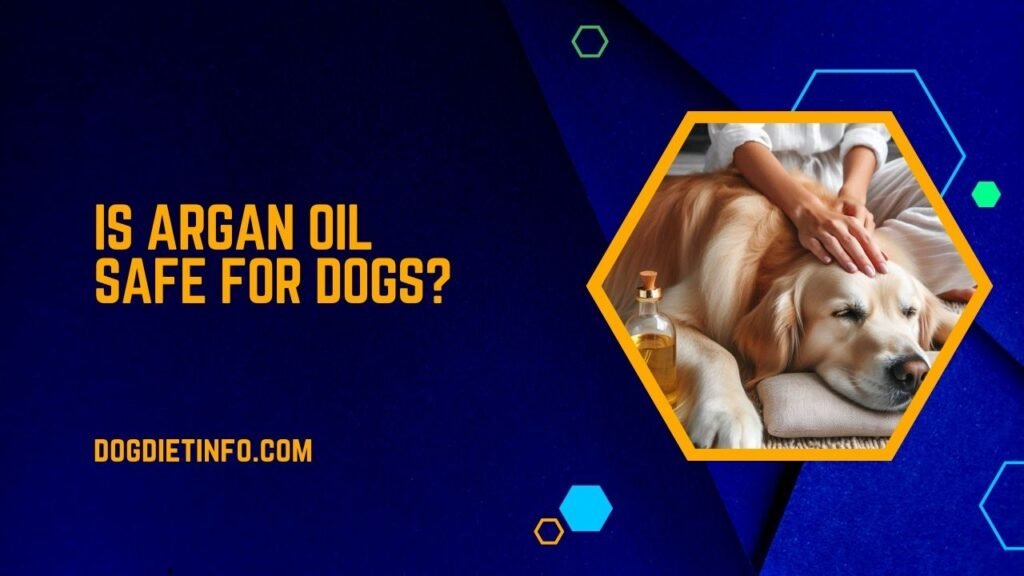Is Argan Oil Safe For Dogs? Argan oil is generally safe for dogs when applied topically in small amounts, helping with skin and coat health.
Argan oil is well-known for its numerous health and beauty benefits, especially for humans.
As pet owners increasingly turn to natural and organic products for their furry companions, argan oil has become a popular option for addressing common skin and coat issues in dogs.
But is argan oil truly safe for dogs, and how can it be used effectively?
In this comprehensive guide, we will explore whether argan oil is a safe remedy for dogs, its potential benefits and risks, and how to use it safely on your pets.
We’ll also dive into some frequently asked questions to help you make an informed decision. [Is Argan Oil Safe For Dogs?]
Contents
What Is Argan Oil?
Origin and Composition of Argan Oil
Argan oil comes from the kernels of the argan tree, native to Morocco. This precious oil has been used for centuries by Moroccan communities for culinary, medicinal, and cosmetic purposes.
Today, it’s a popular ingredient in skincare and haircare products because of its high concentration of essential fatty acids, antioxidants, and vitamin E.
The process of extracting argan oil is labor-intensive and involves drying the fruit, removing the fleshy part, and then extracting the oil from the nuts.
This traditional extraction method helps preserve the oil’s rich composition, ensuring its potency and effectiveness.
Common Uses of Argan Oil for Humans
For humans, argan oil is renowned for its hydrating and anti-aging properties. [Is Argan Oil Safe For Dogs?]
It’s often used in lotions, shampoos, and facial serums due to its ability to repair damaged skin, reduce the appearance of wrinkles, and add shine to hair.
With these benefits in mind, many pet owners have started to wonder if argan oil can offer similar advantages for their dogs.
Is Argan Oil Safe for Dogs?
In most cases, argan oil is considered safe for dogs when used correctly. It can be a beneficial addition to your pet’s grooming routine, especially for dogs with dry skin or a dull coat.
However, as with any natural product, it’s essential to know how to apply it properly and understand the potential risks before using it on your pet.
Topical Use for Skin and Coat
Argan oil is most commonly applied topically to a dog’s skin or coat. [Is Argan Oil Safe For Dogs?]
When used in moderation, it can provide significant benefits, such as moisturizing dry skin, soothing irritations, and promoting a healthy, glossy coat.
Some dog owners even use argan oil as a conditioner after baths, rubbing a few drops into the fur to lock in moisture.
Possible Side Effects
Despite its numerous benefits, there are some risks associated with using argan oil on dogs, particularly if it’s not used properly.
Over-application can cause the dog’s fur to become greasy and difficult to manage. Some dogs may also have sensitive skin or allergies that could be aggravated by argan oil.
Additionally, although it’s rare, some dogs might experience allergic reactions to argan oil. [Is Argan Oil Safe For Dogs?]
If your dog starts scratching excessively, develops redness, or shows other signs of irritation, discontinue use immediately and consult your veterinarian.
Ingestion Considerations
One of the primary concerns with using argan oil on dogs is the risk of ingestion. While small amounts are unlikely to cause harm, large quantities could lead to gastrointestinal issues such as vomiting or diarrhea.
Since dogs often lick themselves after grooming, it’s essential to ensure they don’t ingest too much argan oil. If your dog has ingested a significant amount, contact your veterinarian for advice.
Veterinary Recommendations
Veterinarians generally agree that argan oil can be safe for dogs when used appropriately, but it’s always a good idea to consult with your vet before introducing any new products into your dog’s routine.
If your dog has specific skin conditions or allergies, your vet may be able to recommend the best course of action for incorporating argan oil into their care.
Appropriate Dosage
Argan oil is highly concentrated, so a little goes a long way. Start by using just a few drops of the oil and gently massage it into your dog’s skin or coat. [Is Argan Oil Safe For Dogs?]
Avoid using too much, as it can make your dog’s fur greasy and may lead to skin irritation. You can gradually increase the amount if necessary, but moderation is key.

Benefits of Argan Oil for Dogs
Argan oil offers several benefits for dogs, particularly when it comes to skin and coat health. Here are some of the key advantages of using argan oil on your dog:
Moisturizing Dry Skin
Dry, itchy skin is a common problem for dogs, especially during the colder months or in dry climates. Argan oil is an excellent moisturizer, helping to hydrate and soothe dry skin.
Its natural composition of fatty acids can restore your dog’s skin barrier, preventing moisture loss and reducing flakiness.
Improving Coat Health
A healthy, shiny coat is a sign of a well-groomed and nourished dog. Regular use of argan oil can improve the overall appearance of your dog’s coat, making it shinier, softer, and easier to groom.
For dogs with coarse or frizzy fur, argan oil can also help smooth the hair and reduce tangles, making brushing less of a struggle.
Healing Wounds or Irritated Skin
Argan oil’s anti-inflammatory and antioxidant properties make it useful for treating minor skin irritations, such as hot spots, rashes, or insect bites.
Applying a small amount of argan oil to the affected area can help reduce inflammation and promote healing. [Is Argan Oil Safe For Dogs?]
Its soothing properties also make it a good option for dogs with chronic skin conditions, such as eczema or dermatitis.
Preventing Skin Infections
The antioxidants in argan oil can help protect your dog’s skin from environmental damage, such as UV rays or pollutants, which can weaken the skin’s defenses and lead to infections.
While argan oil is not a substitute for medications or treatments prescribed by your vet, it can be used as a supplementary aid to support your dog’s skin health.
See Also: Is Brewers Yeast Safe For Dogs?
Potential Risks of Argan Oil for Dogs
Although argan oil has many benefits, it’s important to be aware of the potential risks. Every dog is different, and some may have adverse reactions to argan oil.
Allergic Reactions
Just like humans, dogs can be allergic to certain substances, including argan oil. Signs of an allergic reaction include redness, swelling, and itching in the area where the oil was applied.
If your dog exhibits any of these symptoms, discontinue use immediately and consult your veterinarian.
Always perform a patch test by applying a small amount of oil to a small area of your dog’s skin before using it more broadly.
Digestive Upsets
Ingestion of argan oil can lead to digestive problems in dogs, especially if they consume large amounts. [Is Argan Oil Safe For Dogs?]
Dogs may lick their fur after argan oil is applied, so it’s important to monitor them closely to ensure they don’t ingest too much.
If your dog experiences vomiting, diarrhea, or other signs of digestive distress after coming into contact with argan oil, contact your vet for guidance.
Overuse Side Effects
Using too much argan oil on your dog’s coat can cause it to become greasy and weigh down the fur. This can make grooming more difficult and may even lead to clogged pores or skin irritations.
It’s best to use a small amount of oil and spread it evenly over the fur, ensuring that it doesn’t build up in any particular area. [Is Argan Oil Safe For Dogs?]
How to Safely Use Argan Oil on Dogs
When using argan oil on your dog, it’s essential to follow some simple guidelines to ensure it’s applied safely and effectively.
Application Tips
- Test a Small Area First: Before using argan oil on a large area of your dog’s skin, perform a patch test. Apply a small amount of oil to a small patch of skin and wait 24 hours to see if there’s any reaction.
- Use Sparingly: Start with a few drops of argan oil and gradually increase the amount as needed. Avoid using too much oil, as it can make your dog’s fur greasy and lead to skin issues.
- Avoid Eyes and Mouth: When applying argan oil, keep it away from your dog’s eyes, nose, and mouth to prevent accidental ingestion or irritation.
- Brush After Application: Once the oil is applied, brush your dog’s coat to evenly distribute the oil and remove any excess.
Best Practices
- Monitor Your Dog: Keep an eye on your dog after applying argan oil to ensure they don’t lick it off. If they do, consider using an Elizabethan collar (cone) for a short period to prevent ingestion.
- Consistency is Key: Use argan oil regularly, but sparingly. Applying it 2-3 times per week is usually sufficient for maintaining healthy skin and a shiny coat.
- Store Properly: Keep the oil in a cool, dry place to preserve its potency and prevent spoilage.
Final Verdict
Argan oil can be a beneficial and safe addition to your dog’s grooming routine when used properly.
Its moisturizing and healing properties can improve the condition of your dog’s skin and coat, helping to soothe dryness and irritation.
However, it’s important to use argan oil sparingly and to consult your veterinarian if your dog has specific health concerns or skin sensitivities.
Always start with a small amount and closely monitor your dog’s reaction to avoid any adverse effects. [Is Argan Oil Safe For Dogs?]
FAQs
Can dogs ingest argan oil?
While small amounts of argan oil are unlikely to cause harm, it’s best to prevent your dog from ingesting it, as large quantities can lead to digestive upset.
How often should I use argan oil on my dog?
It’s generally recommended to apply argan oil 2-3 times per week to maintain a healthy coat and skin.
What should I do if my dog has a reaction to argan oil?
If your dog shows signs of an allergic reaction, such as redness or itching, discontinue use and consult your veterinarian.
Is argan oil better than coconut oil for dogs?
Both oils offer unique benefits. Argan oil is excellent for moisturizing and improving coat health, while coconut oil has antimicrobial properties that can help with infections.
Can argan oil help with my dog’s dandruff?
Yes, argan oil can help reduce dandruff by moisturizing dry skin and preventing flakiness. [Is Argan Oil Safe For Dogs?]
Conclusion: Is Argan Oil Safe For Dogs?
In conclusion, argan oil can be a safe and effective remedy for improving your dog’s skin and coat when used appropriately.
Its natural properties make it a versatile tool for addressing common skin issues, such as dryness, itchiness, and dull fur.
As with any new product, always consult your veterinarian before incorporating argan oil into your dog’s care routine, and use it sparingly to ensure your pet stays healthy and happy.

Derrick Wilcox is a certified canine behaviorist with over 12 years of experience at Happy Paws Animal Clinic and Pawsitive Training Center, helping pet owners ensure safer, healthier, and happier lives for their dogs.



